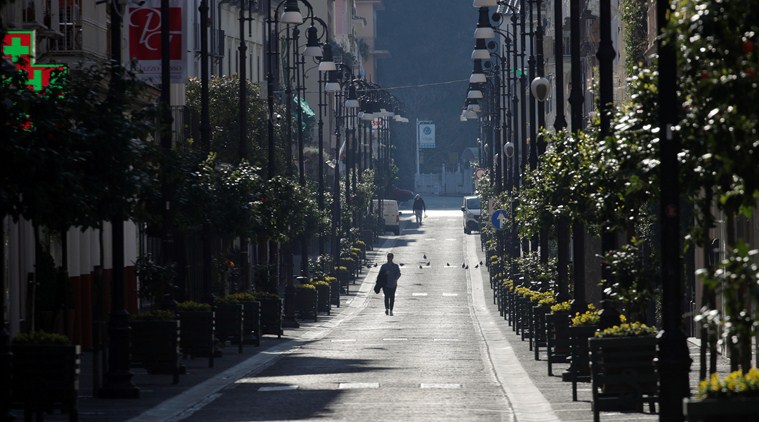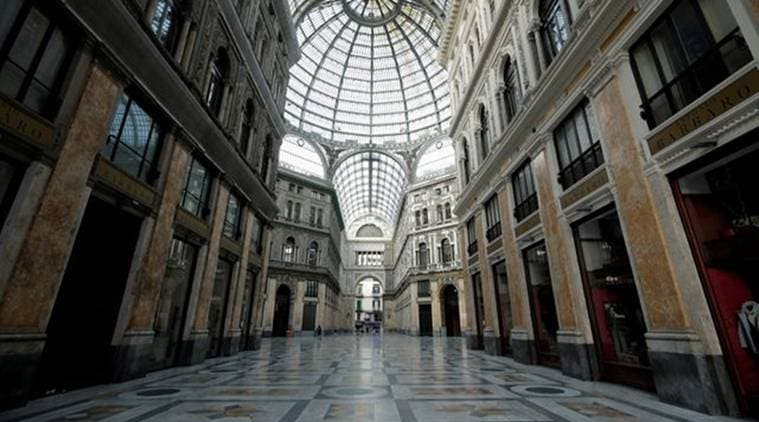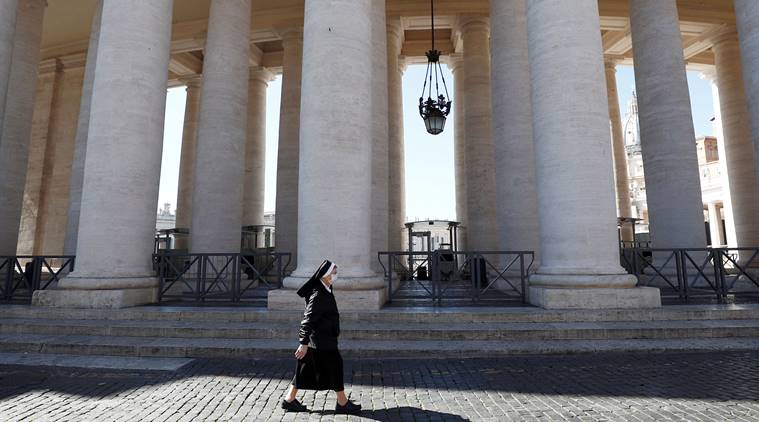 An empty street in Italy. (File Photo)
An empty street in Italy. (File Photo)
My darling daughter and nephews.
For us, 1980s kids, 2020 seemed like this magical number. So far away, so perfect in its symmetry, so pregnant with expectations — flying cars, medical miracles, space travel, global utopia, and cyborgs! (Well, given our smartphone addiction, the last one is probably came true).
But as 2020 crept up on us, it didn’t seem that radical. It seemed a year of hopes drowning. Mankind had forgotten its pioneering space-faring dreams, relegating them to the private fantasies of megalomaniac billionaires. Capitalism had won the battle of ideas as we, the 1 per cent, in our gilded cages consumed the planet and laid claim to half its resources, and considered it completely okay. The digital revolution did not deliver us our sunlit Utopian fields… instead it dumbed us down to 140 character tweets of inanity, or invective laden Facebook posts fired at tangential contacts regurgitating arguments that we didn’t fully understand and that barely mattered, or Instagram drops with their choreographed vacuuousness and illusions of perfectness veiling the crying empty souls behind them. Technology gave us social fragmentation, echo chambers, the post-truth media, and celebrity leaders of a growing idiocracy. A million brown packages and pre-packed meals zipping across the world to our doorstep, sparing us the pain of real human interaction. Eat, drink, consume, post, shout, consume again, rinse, repeat. Welcome to 2020.
And then… the world stopped…
 FILE PHOTO: Galleria Umberto shopping mall is seen, on the fourth day of an unprecedented lockdown across of all Italy imposed to slow the outbreak of coronavirus, in Naples, Italy. (REUTERS/Ciro de Luca/File Photo)
FILE PHOTO: Galleria Umberto shopping mall is seen, on the fourth day of an unprecedented lockdown across of all Italy imposed to slow the outbreak of coronavirus, in Naples, Italy. (REUTERS/Ciro de Luca/File Photo)
At the turn of the (19th) century, HG Wells wrote of an Earth narrowly saved from a Martian invasion by the invader’s lack of immunity to pathogens — “thwarted by the humblest things that God, in his wisdom, has put upon this earth”.
Today, that very same humblest of things, a virus that is barely alive, invisible to the eye, inconceivable as a life form, brought the world and all its pretensions of homo deus screeching to a silent and eerie halt.
Suddenly, we could not consume any more.
One by one the temples that made us great and made us inane fell silent. Markets were abandoned, stock markets began a silent free-fall, and our business districts with rows of screen-rapt zombies closed down.
One-by-one we fought, we denied, we rebelled, we raged, but in the end we accepted.
 Police guard the Kaaba, the cube building at the Grand Mosque, in the Muslim holy city of Mecca, Saudi Arabia, Friday, March 6, 2020. Saudi Arabia emptied Islam’s holiest site for what they say sterilization over fears of coronavirus. (AP/File Photo)
Police guard the Kaaba, the cube building at the Grand Mosque, in the Muslim holy city of Mecca, Saudi Arabia, Friday, March 6, 2020. Saudi Arabia emptied Islam’s holiest site for what they say sterilization over fears of coronavirus. (AP/File Photo)
And then, something strange happened…. As we hunkered in our homes and the battle against the virus raged silently outside, for a brief second we asked ourselves, have we woken up from a trance? Is this almost…. Nice?
Could it be that this treadmill we call life, is but a cult? Why was stuffing our bank account with zeros, or our media feeds with poses, or our lives with stuff stuff stuff so important? Who made it so? Why?
Could it be, could it be, that life was better lived with less? Afternoon heat drenching delicious boredom? Putting a child to bed everyday free from worry about the million deadlines of life? Evenings spent all dressed up with nowhere to go, but to trivia games and impromptu dance parties with those you love the most? FaceTime chats and telephone calls of depth and meaning a dozen social interactions never reached? Puzzling over improper fractions with your home schooled children? Birds on your window sill, and silence beyond? Stark, smoke-free skies and stars. Glorius, bright, clear, stars.
 A nun wearing a protective face mask walks past the Bernini Colonnade surrounding St. Peter’s Square as Pope Francis gives his weekly general audience via transmitted video a day after the Vatican closed the square and Basilica due to coronavirus concerns, as seen from Rome, Italy. (REUTERS/Guglielmo Mangiapane/File Photo)
A nun wearing a protective face mask walks past the Bernini Colonnade surrounding St. Peter’s Square as Pope Francis gives his weekly general audience via transmitted video a day after the Vatican closed the square and Basilica due to coronavirus concerns, as seen from Rome, Italy. (REUTERS/Guglielmo Mangiapane/File Photo)
When we could no longer venture out, many of us began a journey inwards. We realised how little we really need and how beautifully simple joy was. We didn’t need supermarket shelves screaming at us with 20 brands of toothpaste. We needed connection, love, compassion. That warm phone call, that chaotic group chat, that meal given to the needy, that tear shed for a stranger’s death a continent away, that impromptu hug in the middle of day.
For that is what makes us human. And that, no pathogen can ever take away.
Papa / Kaka
Rohan Parikh, a businessman working in education and real estate, is an alumni of the Wharton School of Business and INSEAD.